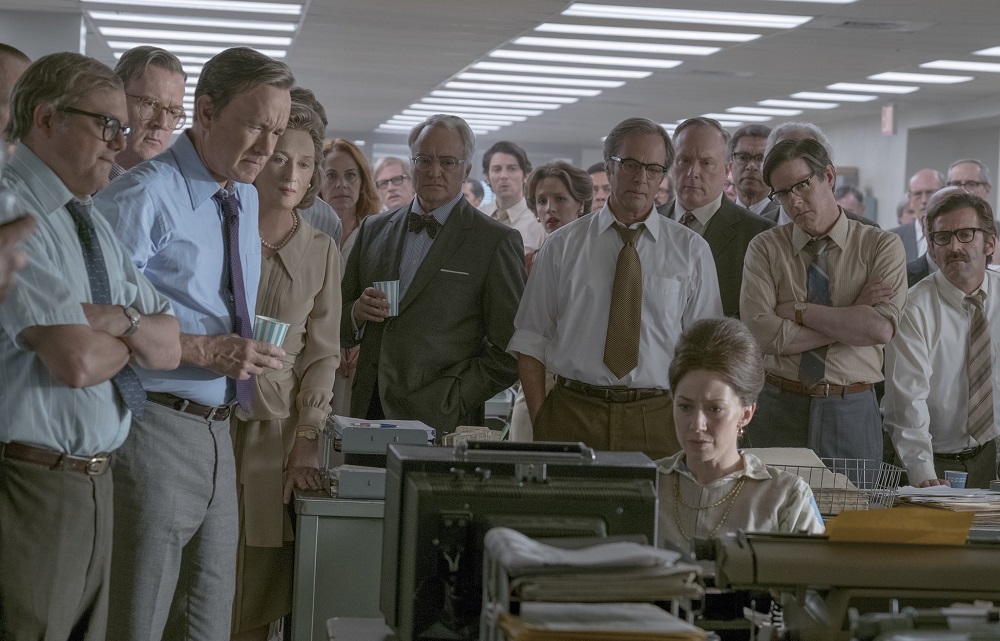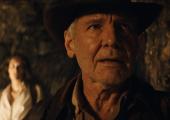It beggars belief that, from the moment Steven Spielberg took delivery of the script by first-timer Liz Hannah, it took a mere 10 months to get The Post in the can. Its subject being the race to publish, that's a fitting rate of production. Introducing the film at its London premiere, Spielberg stressed the urgency of a story about the media under renewed attack. For Richard Nixon, who tried to suppress the bad news about Vietnam, read Donald Trump’s confected concept of fake news.
The Post has since acquired an extra timeliness. There’s an indelible image towards the end of Katharine "Kay" Graham, the proprietor of the Washington Post (Meryl Streep), walking down the steps of the Supreme Court through a Red Sea of young women. Yes, it's unlikely such a crowd would be gender-segregated, but as well as a clarion call about press freedom, The Post trumpets female heroism in a mainly male world. Boswell’s Life of Johnson is quoted on the matter: “a woman's preaching is like a dog's walking on his hind legs. It is not done well; but you are surprised to find it done at all.”
This is a film of two halves. We open in Vietnam, the whump of choppers evoking the first strains of Apocalypse Now. US grunts are taking a pounding in the jungle under the all-seeing eye of reporter Daniel Ellsberg (Matthew Rhys). On the flight home Ellsberg catches wind of Secretary of Defense Robert McNamara’s (Bruce Greenwood) view that the facts of an unwinnable conflict are being kept from the American public. He embarks on a covert operation to smuggle toxic evidence out of the Pentagon that successive administrations – including JFK's – have suppressed the truth about American bellicosity in Vietnam. The race is on to publish: the New York Times make a start, despite the efforts of the Washington Post, rambunctiously edited by Ben Bradlee (Tom Hanks) to muscle in on their top Nam reporter Neil Sheehan. (Sheehan, a star witness in the recent series The Vietnam War, is actually unseen here.) Then the White House slaps an injunction on the Times, leaving the field open to the Post if it has the audacity to defy Tricky Dicky, whom we see yakking on the phone, through a window as if under the surveillance of posterity.
The race is on to publish: the New York Times make a start, despite the efforts of the Washington Post, rambunctiously edited by Ben Bradlee (Tom Hanks) to muscle in on their top Nam reporter Neil Sheehan. (Sheehan, a star witness in the recent series The Vietnam War, is actually unseen here.) Then the White House slaps an injunction on the Times, leaving the field open to the Post if it has the audacity to defy Tricky Dicky, whom we see yakking on the phone, through a window as if under the surveillance of posterity.
Up to this point the slow-burn narrative is a thicket of pernickety groundwork, featuring much dashing in and out of rooms and up and across busy streets. There’s some fun stuff about circumventing Nixon’s ban on the Post reporting his daughter's wedding. Then Spielberg turns up the heat and the second half blooms into a gripping disquisition on the First Amendment.
It is vastly enhanced by the authority of Streep and Hanks, the king and queen of Hollywood ideally cast as two titans of all-American integrity. To see them together for the first time – an encounter on a par with De Niro and Pacino in Heat – is one of the film’s richest pleasures. Hanks is all fizzing energy and ornery moral sense. Streep’s is a quieter performance as a woman finding her voice; when the camera, having hovered godlike above her, zooms in on her face as she makes the fateful decision, her masterclass display of uncertainty wrestling with courage merits a standing ovation. Hers is a physical journey too: when we first meet the woman who will later glide like a swan through crowds, she's either dropping things or bumping into them.
The battle isn’t solely between the Post and the White House. During the window of opportunity presented by the temporary silencing of the Times, the Post’s board is forcing through the flotation of the family-owned company. But investors can withhold much-needed funds if prompted by “a catastrophic event”. The imprisonment of the proprietor and the editor would answer to that description. The internal skirmish between pragmatists and idealists adds to the sense of jeopardy, though it also feels packed in to up the stakes, and therefore oddly disingenuous in a story about upholding the truth. The flotation subplot helps to establish Kay Graham – who has inherited her role from, successively, her late father and husband, dead from suicide – as a lone woman standing her ground in a phallocracy. At the American Stock Exchange she passes through all the wives waiting subserviently outside the boardroom. There are plenty of meaty supporting roles for actors – Jesse Plemons catches the eye as a preppy lawyer, Bradley Whitford as Graham's main opponent on the board. Of the other women, the role of both Alison Brie as Graham’s daughter and Sarah Paulson as Bradlee’s wife is to stiffen spines. In the bustling newsroom, Carrie Coon is a society reporter who ballsily steps up to the plate, while Jessie Mueller enjoys a spotlight at the climax when, listening on the phone, she passes on the judgement of the Supreme Court to the rest of the newsroom.
The flotation subplot helps to establish Kay Graham – who has inherited her role from, successively, her late father and husband, dead from suicide – as a lone woman standing her ground in a phallocracy. At the American Stock Exchange she passes through all the wives waiting subserviently outside the boardroom. There are plenty of meaty supporting roles for actors – Jesse Plemons catches the eye as a preppy lawyer, Bradley Whitford as Graham's main opponent on the board. Of the other women, the role of both Alison Brie as Graham’s daughter and Sarah Paulson as Bradlee’s wife is to stiffen spines. In the bustling newsroom, Carrie Coon is a society reporter who ballsily steps up to the plate, while Jessie Mueller enjoys a spotlight at the climax when, listening on the phone, she passes on the judgement of the Supreme Court to the rest of the newsroom.
In such tearjerking moments does Spielberg deposit his unmistakable pawprints. There are splendid flourishes that could only come from him: the pages of a newspaper blowing from a man’s hands in the street; Bradlee’s kid making a mint selling lemonade as the paper’s top brass set up camp in the editor's home; the thundering of the presses, causing the newsroom to shake like monsters from some other corner of the director's imagination. This is Spielberg’s Vietnam movie (unless you count Jaws), an impeccable throwback to the 1970s in tone and look. Where his dauntless contemporaries Michael Cimino and Francis Coppola ventured into the heart of darkness, he has stayed at home to explore a war on the home front, an assault on truth whose notorious sequel is evoked in a coda as a security guard at the Watergate building spots a break-in. This welcome paean to print is glorious broadsheet filmmaking.
@JasperRees
Overleaf: TO THE RESCUE: TOM HANKS SAVES THE WORLD (AND SOME IFFY MOVIES)








 Stravinsky: Petrushka, Agon (arranged for piano duet and two pianos by the composer) Bugallo-Williams Piano Duo (Wergo)
Stravinsky: Petrushka, Agon (arranged for piano duet and two pianos by the composer) Bugallo-Williams Piano Duo (Wergo)


 The race is on to publish: the New York Times make a start, despite the efforts of the Washington Post, rambunctiously edited by Ben Bradlee (Tom Hanks) to muscle in on their top Nam reporter Neil Sheehan. (Sheehan, a star witness in the recent series The Vietnam War, is actually unseen here.) Then the White House slaps an injunction on the Times, leaving the field open to the Post if it has the audacity to defy Tricky Dicky, whom we see yakking on the phone, through a window as if under the surveillance of posterity.
The race is on to publish: the New York Times make a start, despite the efforts of the Washington Post, rambunctiously edited by Ben Bradlee (Tom Hanks) to muscle in on their top Nam reporter Neil Sheehan. (Sheehan, a star witness in the recent series The Vietnam War, is actually unseen here.) Then the White House slaps an injunction on the Times, leaving the field open to the Post if it has the audacity to defy Tricky Dicky, whom we see yakking on the phone, through a window as if under the surveillance of posterity. The flotation subplot helps to establish Kay Graham – who has inherited her role from, successively, her late father and husband, dead from suicide – as a lone woman standing her ground in a phallocracy. At the American Stock Exchange she passes through all the wives waiting subserviently outside the boardroom. There are plenty of meaty supporting roles for actors – Jesse Plemons catches the eye as a preppy lawyer, Bradley Whitford as Graham's main opponent on the board. Of the other women, the role of both Alison Brie as Graham’s daughter and Sarah Paulson as Bradlee’s wife is to stiffen spines. In the bustling newsroom, Carrie Coon is a society reporter who ballsily steps up to the plate, while Jessie Mueller enjoys a spotlight at the climax when, listening on the phone, she passes on the judgement of the Supreme Court to the rest of the newsroom.
The flotation subplot helps to establish Kay Graham – who has inherited her role from, successively, her late father and husband, dead from suicide – as a lone woman standing her ground in a phallocracy. At the American Stock Exchange she passes through all the wives waiting subserviently outside the boardroom. There are plenty of meaty supporting roles for actors – Jesse Plemons catches the eye as a preppy lawyer, Bradley Whitford as Graham's main opponent on the board. Of the other women, the role of both Alison Brie as Graham’s daughter and Sarah Paulson as Bradlee’s wife is to stiffen spines. In the bustling newsroom, Carrie Coon is a society reporter who ballsily steps up to the plate, while Jessie Mueller enjoys a spotlight at the climax when, listening on the phone, she passes on the judgement of the Supreme Court to the rest of the newsroom.